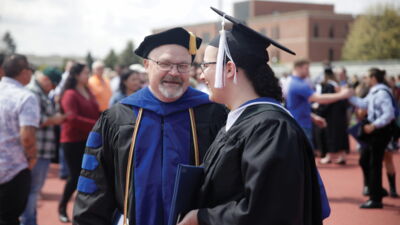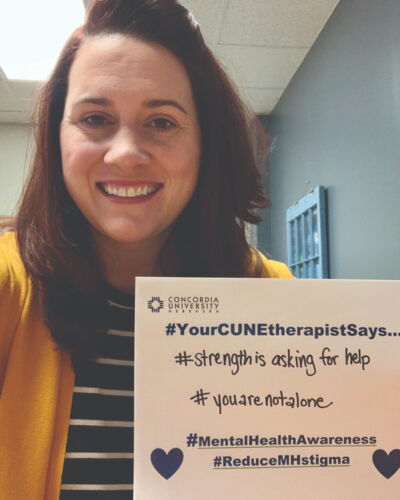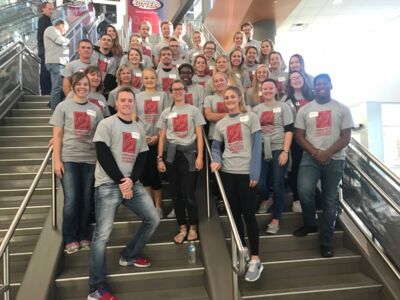
To Walk Alongside
Story: Brooke Lange
Photos: Courtesy of Concordia Marketing
Concordia’s academic programs help prepare future counselors to restore relationships by using a scriptural lens.
It is a Thursday night at Concordia University, Nebraska, around 8:30 p.m. In the basement of Thom Leadership Education Center, around 25 students are divided in groups of three. In each group of three, one is talking about a problem they decided to bring to class that night, one is listening and asking questions and the third person quietly observing. They do this form of counseling for about eight minutes until a timer goes off and they get a break.
This practice is the cornerstone of Concordia Nebraska’s Introduction to Counseling class. Students spend most of the semester learning to listen actively, respond with empathy, ask appropriate probing questions and ultimately, attempt to recognize a major theme of the sharing student’s problem.
After the students have finished this cycle of counseling, Professor Venita Steinbauer goes to the front of the room and reminds them: “You are not there to tell the person what to think. You are there to walk alongside them and guide the conversation.” The class listens, seems to collectively take a deep breath and begins again.
I’ve taken the class; I’ve been a teaching assistant for it for three semesters afterwards, and each semester I become more convinced that the practice of truly listening to someone is a sacred practice. Every semester, I see people who did not know each other previously find that they are going through the same difficult situation. As the class goes on, the students begin to see each other as more than one dimensional background characters in their own lives, but real, living human beings with souls and problems. The power of the time spent listening to others is unique and palpable.

What distinguishes Concordia from other colleges that may want to teach you psychology is not this feeling of camaraderie or the understanding that selflessness is a good thing. Those are inherently human things. The thing that sets Concordia apart is that faith allows people to have a basis for understanding why compassion for others and the restoration of relationships is so important.
The real difference is that we know that this connection and the restoration that comes from relationships is something that comes directly from God. There are two pieces to this. One is recognizing the compassion that God grants us, and the second is understanding the God-given structure of relationships.
Dr. Thad Warren CO ’91 GR ’96, professor of psychology and director of Concordia’s new master’s program in family life education, bolsters this idea. He says, “In Concordia’s psychology classes, we teach a holistic perspective, but we teach it through a scriptural lens. We want people to be aware of all of the situations they may encounter in this field, but also let them know how Christians would view this. Rather than teaching what the secular world teaches, we will look at what the secular world says and view it through a Christian framework.”
This lens allows students the opportunity to look more compassionately at the world around them. Dr. Kathy Miller, professor of sociology at Concordia, says, “It can be hard to understand why people live how they do and make choices that differ from us, but Christ did not come for the privileged, He wants us to care and love our neighbor even when we disagree with them. I encourage my students to understand and learn about people up close, so we are less likely to judge others but see people as God sees all of us.”
It's incredible that Christ would design for us to not be alone and be in relationship with one another from our very first conception and breath.
The desire to see people as God sees people permeates all coursework at Concordia. Standard classes for psychology undergraduates include abnormal psychology, research and a summative capstone project at the end of the program. All of these classes more holistically inform students about the people and the world around them. Miller says, “My faith very much informs the field I am in and the desire to help students see people/groups who lack power, resources, etc. as people that Christ calls all of us to - to see everyone as the beloved, deserving of love, mercy and help.”
If Concordia’s undergraduate psychology programs give people the groundwork to see people as Christ sees them, then the graduate programs give the opportunity to develop the ability to restore relationships to the way that Christ sees them. Kathleen (Garner) von Kampen ’10, director of Concordia’s marriage and family therapy program, states the intricacy of this design. “It's wonderful to consider that Christ would design for us not to be alone but be in relationship with one another from our very first conception, just as the Persons of the Trinity lived together and were/are in relationship to one another.”

Currently, Concordia has two masters options to practically work on the restoration of this God-given institution. Concordia currently offers a masters in family life education and a masters in marriage and family therapy. The masters in family life education equips people to work with families in the church, while marriage and family therapy gives students the ability to become licensed therapists. Throughout both programs, students will take classes on the family systems framework, promoting family/work balance and other important topics.
Additionally, there is a responsibility to serve members of the church body. “There are people hurting, grieving, struggling inside the church as well as outside the church. We want to serve these people and our church workers so that they can continue to serve their congregations,” says von Kampen.
Even though the specific people that one may end up working with after Concordia’s marriage and family therapy program may vary, the way that one treats individuals remains the same. Von Kampen states, "The gift to serve our neighbor is not just found in our family, but in everything that we do. The goal is to walk alongside someone throughout their struggles and see them the way that Christ sees us: as someone broken, underserving of forgiveness but receiving reconciliation through God’s grace.”